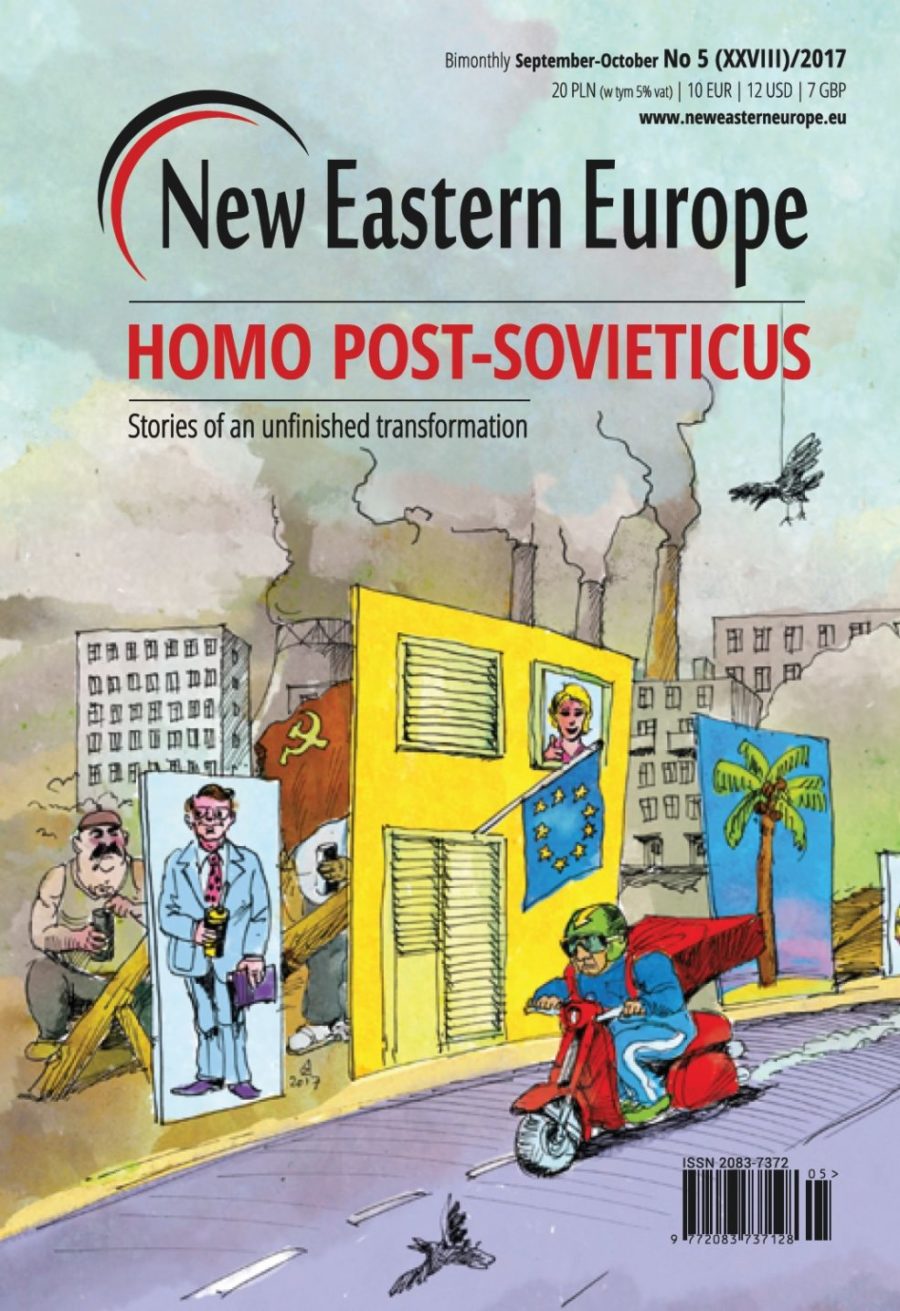Issue 5/2017: Homo post-sovieticus
Stories of an unfinished transformation
Anyone interested in Central and Eastern Europe understands that this region is far from monolithic, also in the implementation (or lack thereof) of western economic and political systems. At the same time we cannot deny there is something idiosyncratic about the former Soviet bloc, something which links its societies together. Either through common experience or history (or both).
October 7, 2017 -
New Eastern Europe
-
IssueIssue #5/2017Magazine

Get this issue delivered straight to your doorstep. Click here to subscribe online today.
We address this phenomenon in this issue roughly using the term Homo post-sovieticus. It allows our authors to talk about the legacy of the socialist past that, as they argue, has not yet fully disappeared. Its traces can be found throughout the region and shape the lives of its many people. These traces have been captured by a group of photographers who collectively call themselves the Sputnik group. Their unique project is presented by Wojciech Górecki in the opening essay to this issue and is accompanied by some their illustrative photographs.
In addition, we tackle the issue of the incomplete system transformation which, in many cases, has allowed for a creation of hybrid socio-economic systems. They may, like in Georgia as discussed by Kaja Puto,be a result of a hasty reconstruction of the state to look more like what is believed to be the West. Or, as is the case of Belarus, which is analysed by Maxim Rust, reveal a slower emergence of collective identity that is both submissive and open, passive and entrepreneurial. A simultaneous challenge and opportunity.
In the case of post-Maidan Ukraine, which without a doubt the transformation has gone much further, the rooting of the western value system is also still under way. As we can see from Andriy Lyubka and Nina Boichenko’s texts the possible risks of its interruption cannot be ignored.
Additionally, in this issue we have prepared two special sections: the first one, published on the 500-year anniversary of Martin Luther’s Ninety-five Theses debates the legacy of the Reformation from our region’s standpoint, while the second, at the end of the issue, is dedicated to Joseph Conrad – a Polish-born writer whose masterpieces have been read and studied throughout the world for generations. Our authors take a new look at Conrad, his influences and how his works are still very relevant in 2017.
Subscribers can now read the all the articles of this issue online at: https://neweasterneurope.eu/in-the-magazine/
Table of Contents
OPINION AND ANALYSIS
Traces of the Soviet Union
Wojciech Górecki
A 21st century Homo sovieticus?
Maxim Rust
A new Georgia?
Kaja Puto
Seeking the ties that bind
Katarina Novikova and Wiktor Trybus
Tired of the status quo
An interview with Nikolay Artemenko
What is a Russian oligarch?
Sean Guillory
Conspiracy theories and the fear of others
Ilya Yablokov
Has the war really changed Ukrainians?
Andriy Lyubka
Inside Ukraine’s ideological renewal
Nina Boichenko
Oxford on the Vistula
Jo Harper
INTERVIEWS
A thief’s fear of punishment is incompatible with democracy
An interview with Anastasia Kirilenko
Not dedicated to big political visions
An interview with Jan Šerek
HISTORY AND MEMORY
Polish encounters
Charles Gati
Connecting histories and geographies. The Jews of Central Asia
Thomas Loy
LEGACY OF THE REFORMATION IN CENTRAL AND EASTERN EUROPE: 1517-2017
On prayer and politics in the GDR
A conversation with Markus Meckel
Poland’s Protestant diversity
Andrzej Zaręba
The Reformation’s unexpected legacy in Ukraine
Kateryna Pryshchepa
The humble pastor
Naphtali Rivkin
EASTERN CAFÉ
Reviews and discussions
Whose hostages?
Yulia Oreshina
When hard words break democracy’s bones
Mateusz Mazzini
The neoliberal world was made for autocrats
Millie Radović
In Russia’s near abroad, storylines matter
Joseph Larsen
Feeling history, 70 years on
Paul Toetzke
Slavic geopolitics
Marek Wojnar
SPECIAL SECTION ON JOSEPH CONRAD
Joseph Conrad. A Polish and European writer
Kinga Anna Gajda
Wherever you may sail, you are always sailing towards Poland
A conversation with Professor Zdzisław Najder
The first transnational author
Laurence Davies
Lord Jim in the 21st Century
Gene M. Moore
Joseph Conrad and the East
Douglas Kerr

































